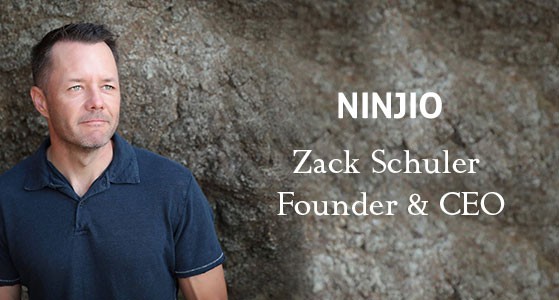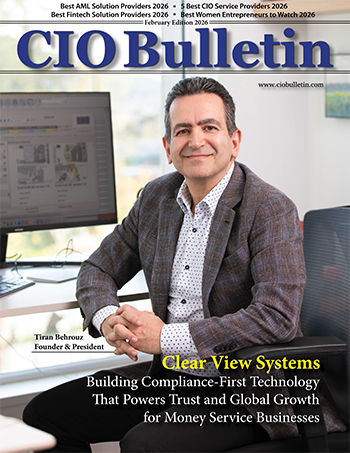10 Best Cyber Security Companies 2020
CIO Bulletin

There is an epidemic of cybersecurity threats and no one’s data is safe anymore. Enterprises can therefore not afford to overlook the primary significance of training its employees of the threats and best practices to encounter cybersecurity. So, how well is your enterprise or employee equipped against highly skilled criminals, malicious hackers or nations that aim to steal data or any other valuable information or service? Here we are for your help; the best solution for all your problems is NINJIO!
NINJIO helps in creating cybersecurity awareness by providing a training solution; it utilizes 3 to 4-minute Hollywood-style micro-learning videos to strengthen individuals and organizations become strong defenders against cyber threats.
The company aids enterprises, employees, and families be efficient against being hacked, which is the first step to defend against today’s increasingly sophisticated cybercriminals.
In conversation with NINJIO Founder, Zack Schuler
Q. Can you give the audience a brief overview of what NINJIO is?
Sure thing. In short, NINJIO produces 3-4 minute long animated episodes that teach the employees of our clients “how not to get hacked.” We do this using Hollywood style story telling with famous actors playing the voices of our animated characters. Each episode is based on a real significant security breach or prevalent scam (i.e. we’ve covered the many COVID-19 scams that are going on right now). We release a new episode each month covering the latest breach or scam. We have been called the “Kings of Content” according to many in the analyst community and our engaging and real-time nature of our content works to change the behavior of our viewers, and significantly raise the security posture of our clients.
Q. Unlike employee training on the next CRM system, where an employees livelihood rests on mastering the software, Security Awareness Training is one of those trainings that an employee may be required to go through, but it isn’t necessary to for them to learn to actually do their job. Therefore, their incentive to pay attention and be engaged is lessened. Many simply don’t have the attention span to keep up with all of the training that is out there. How does NINJIO attack that problem?
There are several keys to keep people’s attention, and to keep them engaged. The first is using storytelling as a medium for education. The reason is that people can become emotionally engaged in a story, where they can’t get emotionally engaged with a lecture. For that reason, you’ll never see our characters speaking directly to the audience (i.e. never lecturing the viewer), but rather speaking to another character whereby learning is done through the story. We do everything in our power to emotionally engage the viewer in the first scene of the episode, and if we are able to do so, it is not hard to keep them engaged until the end, as each episode is only 3-4 minutes long.
Q. Perhaps the biggest problem that we face is that people are curious. It’s the number one reason why people click on a link they shouldn’t, open an attachment they shouldn’t, or visit a website they shouldn’t. How does NINJIO address curtailing people’s curiosity?
Without curiosity, we as a species would not have created the staggering amount of new innovation that we’ve created today. While curiosity is great for our progress, it is really bad for cybersecurity. Curiosity is the number one reason why people click on links that they shouldn’t, visit websites they shouldn’t, or open attachments they shouldn’t. Curiosity is our number one enemy in the cybersecurity human behavior world.
In order to “cure curiosity” or at least put a large damper on it, you must do it through frequent exposure to security awareness bits. With NINJIO, we aim to have a minimum of four touchpoints every month, with every viewer. Every month is based on a particular “theme” (i.e. a particular attack vector or scam) and we provide reinforcing material weekly to the employee to reinforce that theme. In the first week we release our episode.
That is followed up with a hand crafted security blog whereby we curate 5 of the best articles from reliable publications about the particular breach and attack, or scam that we are covering. In our second week, we release an infographic that can be consumed in less than 30 seconds, going over the attack and the teachable moment(s). In our third week, we release our anchoring cartoon that can be consumed in less than 10 seconds that anchors the teachable moment into the brain. In the last week, we create a buzz surrounding the next episode that is to come with an episodic poster, appropriate to either be hung up, or for digital distribution.
Q. I’ve read that each subscription includes “Friends and Family Use Rights”. Can you elaborate on how that works, and what your strategy is behind that?
Back in 2017, we were told by analysts, in no uncertain terms, “NINJIO, you have the only content that crosses over so well from work to home.” It was at that moment where I had the thought “If I can get the family watching the same episode that the employee at work watched, and I can create a cybersecurity dialogue around the family dinner table, I’ll have a game changer.” Why? Because the minute that you get the employee at work to make a personal connection with our content knowing that their entire family is watching and learning from it, the employee has a paradigm shift that while NINJIO is educating me to protect my work environment, at the end of the day, I’m educating myself to protect myself, as well as my family, at home. NINJIO is then viewed as an “Employee Benefit” as opposed to training.
Meet Zack Schuler
In July 2015, two years after his I.T. services company was acquired, Zack Schuler was struck with an idea after reading an article in Cybersecurity Trade Publication about the difficulty of educating people on cybersecurity. Within minutes, Zack envisioned a security awareness business that would use Hollywood-style storytelling to educate people about cybersecurity, breaches, and easily avoidable threats. This wasn’t going to be a “check the box” training program; this was going to be a platform driven by emotionally connected content that could change human behavior.
He enlisted former college friend Bill Haynes, a member of the Writers Guild of America, who has over 70 episodes of CSI: NY and Hawaii Five-0 (written/produced) on his list of accomplishments. Next, he tracked down animation expert Ben Reynolds and another long-time friend, award-winning creative director/designer, Roy Dequina. After months of hashing out the details, NINJIO came to life.

Insurance and capital markets







